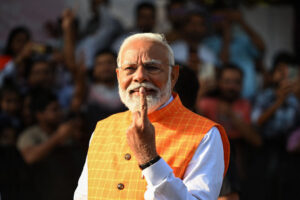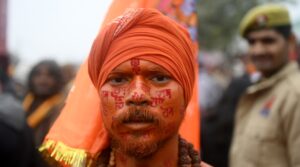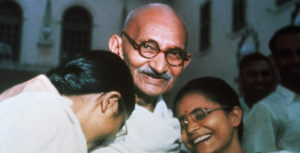After bagging the Booker for The God of Small Things in 1997, Arundhati Roy made a life-altering decision: “to postpone reading Don DeLillo’s big book” about nuclear and bodily waste in order to make time for “reports on drainage”. This was a swipe at Mahatma Gandhi, a curmudgeonly champion and later a begrudging reformer of the caste system, who could do no better than deride the American writer Katherine Mayo’s criticisms of casteism and misogyny in Mother India as a “drain inspector’s report”. Roy has the obverse habit of mind: bring on the drain inspectors’ reports.
One suspects she has still not got around to plodding through DeLillo’s Underworld. What a shame, you might say, but rest assured that in her case, it was a sensible choice. For the past 30 years or so, perhaps more so than any other denizen of her class, Roy has ventriloquised the rage of the rabble. What’s more, hers has been an admirably dependable dissidence, all the more welcome in a landscape where liberals such as the columnists Ashutosh Varshney and Pratap Bhanu Mehta turn coat at the drop of a hat; both have since returned to their original anti-Hindu nationalist positions, the latter only after he was hoisted with his own petard when Hindu nationalists forced his resignation from Ashoka University. Roy, by contrast, has been a paragon of clarity, nothing short of a national treasure. ¡No pasarán! has been her motto, and it has largely served her well.
Until now. Smarting from his recent humbling at the polls, India’s Hindu nationalist ruler Narendra Modi has decided to lash out at his long-standing critics. Roy, it seems, is enemy number one. A speech she made in 2010 has been strenuously unearthed, on the strength of which she has been charged under the Unlawful Activities Prevention Act, which permits detention without trial. Accordingly, Delhi’s top mandarin has given the city police the green light to prosecute Roy. Will she be arrested? We don’t know yet. What is clear, though, is that the celebrations by liberals following the election have been premature. So long as Modi is in power, his reduced majority notwithstanding, the war on free speech and religious minorities will continue.
Roy’s small-minded critics can tar her with the brush of “anti-Indian” sentiment all they like, but, as she has time and again made clear, it is a higher nationalism that she tenaciously answers to. Indeed, there can be no greater act of patriotism than to point to the enormities in one’s own land. Lesser mortals, of course, would much prefer to sweep injustices under the carpet.
Roy’s cardinal sin, it appears, was to argue that “Kashmir has never been an integral part of India”, a self-evident truth to any right-thinking person. A third of the majority-Muslim region is, in fact, directly administered by Pakistan. As for the part that falls in India, it has alternated between military, presidential, and scarcely democratic rule; in other words, Kashmiris have been denied the free and fair representation accorded to their brethren in the Hindi belt. To all intents and purposes, Delhi’s rulers have treated the place as an internal colony, subjecting its people to the strappado, pellet guns, internet blackouts, and — until 2019 — even different laws. But in stating the obvious, Roy has been consigned by both of India’s main parties, the press and the bien-pensant bourgeoisie to that circle of hell reserved — in her words — for “hysterical, lying, anti-national harridans”.
Her critical perspective, one surmises, owes to her intellectual formation. Born in Shillong in India’s forested and tribal northeastern enclave — a world away from the Hindi heartland — Roy perforce could not partake in the democratic self-congratulation of the country’s ruling class. This was a land — in nationalist lexicon — infested with insurgencies. The governance of these areas was for long given over to Delhi’s emissaries, typically paramilitary outfits operating a shoot-on-sight policy.
Then there is Roy’s Jacobite Syrian heritage, something her Hindu nationalist critics never fail to mention. When they call her Suzanna Arundhati Roy — her full name — it’s a dog whistle everyone can hear. As a contemptible Christian, the insinuation goes, she has it in for India. Roy, however, has never been an uncritical admirer of the faith. She has followed in the footsteps of her feminist mother, Mary Roy, who used to be a name to reckon with in the Eighties, when she successfully campaigned to institute equal inheritance rights for Syrian Christian women, hitherto denied their fair share.
Thereafter, Roy grew up between Kerala’s backwaters and the hilly Nilgiris, both pastoral arcadias that nurtured an interest in conservation, before going up to the School of Planning and Architecture, where she read the latter and met her beau, Gerard da Cunha. The two spent the rest of their university years quite literally slumming it in a nearby slum, not long after she became estranged from her family; “they pretended to be married in deference to the slum’s conservative mores,” the New York Times explains.
A second relationship accompanied a turn to the cinema. This was a productive period for Roy, who played a “tribal bimbo” in Massey Sahib and wrote the screenplay for In Which Annie Gives It Those Ones, both directed by her husband Pradip Krishen. Fame and notoriety followed in 1994, when she took the director Shekhar Kapur to task for depicting the rape of Phoolan Devi, a Robin Hoodesque outlaw turned lawmaker, in Bandit Queen. “You’ve turned India’s most famous bandit into history’s most famous rape victim,” and without her consent at that, wrote Roy.
Her breakout year was 1997. It was, in a sense, India’s breakout year too. The country celebrated the 50th anniversary of its independence amid serious stocktaking. Roy’s debut novel, The God of Small Things, for which she received a £500,000 advance, no doubt profited in some small measure from its propitious timing — Elizabeth Windsor was visiting India when Roy won the Booker, and the British press was gripped by a sense of patrician benevolence to the former colony — though this, of course, does not diminish her many considerable talents. Roy’s achievement was her singular authorial voice, reassuringly universalist but at the same time free from the corny clutches of magical realism. “My book doesn’t trade on the currency of cultural specificity,” she said at the time.
The laboriously political work of intercaste erotica wasn’t for everyone. Carmen Callil, chair of the previous year’s panel of judges, thought it “vulgar and execrable”. Peter Kemp of the Sunday Times found it twee and puerile. Even so, few could deny that it was unlike anything else available in the post-Cold War literary market — passionate, political, punchy, prurient. Kerala’s communist government put her on trial for obscenity, though one wonders if it was instead her “anti-Communist venom” — as Kerala’s chief minister put it — that incensed the apparatchiks. Roy lampoons the democratic Left much in the manner of Jaroslav Hašek, who sent up The Party of Moderate Progress Within the Bounds of the Law. In Small Things, communist waiters dance attendance on fat-cat tourists at the Hotel People, located in the ancestral home of the communist party chief, E.M.S. Namboodiripad, no less.
If all of this is a little on the nose, it also points to a broader defect in her writing, and indeed her activism, which has taken centre stage since the publication of Small Things: her intransigence. The fact is that the violent overthrow of the state that she advocates has failed every time it has been tried: 1948, 1967, 1969. In the face of state repression, the insurrectionary Left simply doesn’t stand a chance. The democratic Left that she disparages has, by contrast, delivered not only high literacy and decent healthcare, but also meaningful land reform in Kerala.
Likewise, as the historian Ramachandra Guha has pointed out, Roy’s earnest stance of ¡no pasarán! may be well-meant, but it is hardly a principle fit for the real world. As an activist, she cut her teeth opposing the construction of the Narmada dam in Gujarat that would have displaced half a million with only a smidgen of compensation. A laudable cause, no doubt, yet her outright opposition to that project, many felt, did the proles a disservice. More moderate parties called for higher compensation and a smaller construction, recognising the uses of a dam to the water-starved peasants of arid Saurashtra and Kachchh. Roy, however, would have no truck with compromise. In her radical zeal, she was ready — in the words of the sociologist Gail Omvedt — to sacrifice the “drought-afflicted” on the altar of the “dam-afflicted”.
Guha upbraided her for her “atavistic hatred of science”, though it seems to me to be more a case of primitivist enchantment. Roy’s bedside reading, one Guardian journalist discovered, was Thomas Paine and Charles Dickens. In the same interview, she gave vent to her disgust with bourgeois philistinism: “the Indian middle class has just embarked on this orgy of consumerism.” Elsewhere, she has patted herself on the back for forgoing a life of cultivated literary elegance in “ridiculously posh” hotels out of love for the lower orders.
Her embrace of the Naxalites, who are waging a guerrilla war against the Indian state, is of a piece with this worldview. True, their grievances against a parade of governments that have dispossessed them in order to sell their lands to grasping industrialists, not to mention deployed private militias to persecute them, are real enough. But the monochromatic fresco she has painted of the militants, extolling them as saints, has been just as misleading as the official narrative, villainising them as terrorists. The districts under Naxal control are no prelapsarian paradise. Many of the Naxal leaders are upper-caste, upper-class Calcutta types, on the run from well-heeled boredom; as it is, they treat the hapless primitives with the same contempt as state authorities. Protection rackets, even deals with the very capitalist nemeses they are meant to be fighting, are common enough.
Similarly, in pooh-poohing what she calls the “Progress project”, Delhi’s target of 10% growth, she betrays the same impulse of Western degrowthers, who fetishise permanent recession. Now, world-historically speaking, no society has been able to redistribute the pie in a more egalitarian fashion without also growing it. Roy would do well to remember the instructive example of the trente glorieuses.
Still, all of this is minor carping. She does a marvellous job of asking the big questions, though one wishes she would also ask the hard ones. For all that, the world needs Arundhati Roy more than it needs her critics. In the war against casteism and sexism, she has distinguished herself as an intrepid front-line maquisarde. The political boldness, moreover, has gone hand in hand with snappy lucidity. Roy’s chosen idiom is the thundering zinger. Here she is ironising the misplaced priorities of Hindu nationalists: in contemporary India, “it is safer to be a cow than it is to be a woman”. On the priapic flood ejaculated in the press in the wake of India’s nuclear test: “reading the papers, it was often hard to tell when people were referring to Viagra and when they were talking about the bomb.”
This is a voice at once playful and powerful. That Narendra Modi can do no better than silence it with brute force is evidence enough that the Hindu nationalists have lost the battle of ideas. If anything, Roy’s impending arrest is a vindication of her worldview.
Disclaimer
Some of the posts we share are controversial and we do not necessarily agree with them in the whole extend. Sometimes we agree with the content or part of it but we do not agree with the narration or language. Nevertheless we find them somehow interesting, valuable and/or informative or we share them, because we strongly believe in freedom of speech, free press and journalism. We strongly encourage you to have a critical approach to all the content, do your own research and analysis to build your own opinion.
We would be glad to have your feedback.
Source: UnHerd Read the original article here: https://unherd.com/





